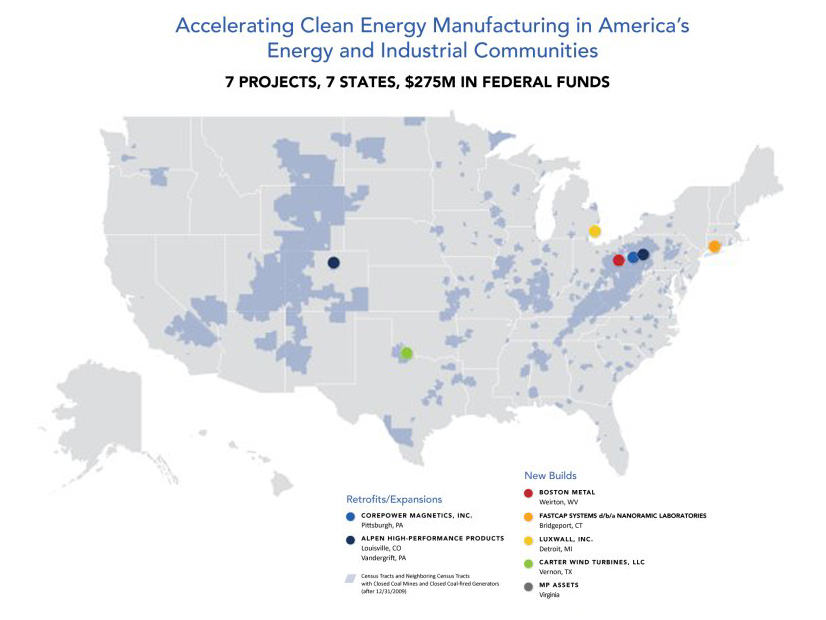The Department of Energy said it would provide $275 million for seven projects around the country that are meant to bolster domestic clean energy supply chains.
The Department of Energy on Nov. 27 said it would provide $275 million for seven projects around the country that are meant to bolster domestic clean energy supply chains.
The agency announced the funding at the inaugural meeting of the White House Council on Supply Chain Resilience, which includes Energy Secretary Jennifer Granholm and other administration officials.
DOE said the $275 million will leverage over $600 million in private-sector investments, which will help create 1,500 high-quality jobs. The projects are intended to address clean energy supply chain vulnerabilities by supporting key materials and components for batteries for grid and transportation uses, wind energy and energy-efficient buildings.
“President Biden’s Investing in America agenda is driving the manufacturing boom while preserving the communities and workforce that have powered our nation for generations,” Granholm said. “With these historic investments, DOE will bring new economic opportunities and ensure these communities continue their key role in strengthening America’s national and energy security.”
The projects aim to strengthen domestic clean energy supply chains by making them more resilient and cost competitive. The projects are with small and medium-sized manufacturers, and they address multiple needs in the domestic clean energy supply chain.
Alpine High-Performance Products will get $5.8 million to retrofit its existing facilities in Louisville, Colo., and Vandergrift, Pa., to produce ultra-thin, triple- and quad-pane insulated glass units for windows. The project will increase the firm’s production tenfold and create 100 good-paying jobs, DOE said.
Boston Metal is getting $50 million to build a new facility in Weirton, W.Va., to manufacture ultrapure chromium and high-temperature alloys used for clean power, fuel cell and green steel supply chains. The facility will be the only high-purity chromium and refractory metal alloy factory, and it will create 200 jobs.
Carter Wind Turbines is getting $20 million to build a new facility in Vernon, Texas, which will help scale production of hybrid wind turbine and energy storage systems that can be used to help power remote facilities. The firm expects to create 300 new jobs at the factory.
CorePower Magnetics is using its $20 million to help retrofit a retired coal plant in Pittsburgh for melting and casting of advanced magnetic amorphous alloys for grid components. The old plant is being used to leverage a significant network of utilities, transportation and facilities to create a factory that will install 10,000 tons of capacity for amorphous metals and magnetic component production. CorePower’s new facility is expected to increase domestic production by 20% and meet an estimated 10% of global demand for the materials.
FastCap Systems, doing business as Nanoramic Laboratories, is building a new facility in Bridgeport, Conn., to make new lithium iron phosphate battery electrodes for grid storage with help from $47.5 million in federal funds. The new manufacturing process at the plant is expected to cut costs, increase energy density and cut energy consumption.
LuxWall is getting $31.7 million to build a new facility in Detroit that will manufacture vacuum-insulated glass window units, which, when retrofitted onto buildings, provide one of the highest energy-efficient returns on investment. The facility is being built on the site of an old coal plant in the Delray neighborhood of Detroit and should create 277 jobs.
The biggest award from the announcements is the $100 million going to MP Assets Corp. to build a factory for lithium-ion battery separators that are important for electric vehicles, a sector dominated by China. The new facility will create 282 jobs on top of securing a domestic supply of the car components.

